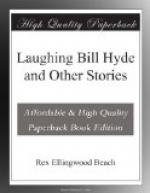It was a long scene and one demanding great force to sustain. It was this, in fact, which had led to the choice of Irving Francis for the principal role, for he was a man of tremendous physical power. He had great ability, moreover, and yet never, even at rehearsals, had he been able to invest this particular scene with conviction. Phillips had rehearsed him in it time and again, but he seemed strangely incapable of rising to the necessary heights. He was hollow, artificial; his tricks and mannerisms showed through like familiar trade marks. Strangely enough, the girl also had failed to get the most out of the scene, and this morning, both star and leading woman seemed particularly cold and unresponsive. They lacked the spark, the uplifting intensity, which was essential, therefore, in desperation, Phillips finally tried the expedient of altering their “business,” of changing positions, postures, and crosses; but they went through the scene for a second time as mechanically as before.
Knowing every line as he did, feeling every heart throb, living and suffering as John Danton was supposed to be living and suffering, Phillips was nearly distracted. To him this was a wanton butchery of his finest work. He interrupted, at last, in a heart-sick, hopeless tone which sorely offended the already irritated Francis.
“I’m—afraid it’s no use. You don’t seem to get it.”
“What is it I don’t get?” roughly demanded the actor.
“You’re not genuine—either of you. You don’t seem to feel it.”
“Humph! We’re married!” said the star, so brutally that his wife flushed painfully. “I tell you I get all it’s possible to get out of the scene. You wrote it and you see a lot of imaginary values; but they’re not there. I’m no superman—no god! I can’t give you more than the part contains.”
“Look at it in this light,” Phillips argued, after a pause. “Diane is a married woman; she, too, is fighting a battle; she is restrained by every convention, every sense of right, every instinct of wifehood and womanhood. Now, then, you must sweep all that aside; your own fire must set her ablaze despite—”
“I? I must do all this?” mocked the other, furiously. “Why must I do it all? Make Norma play up to me. She underplays me all the time; she’s not in my key. That’s what’s the matter—and I’m damned tired of this everlasting criticism.”
There was a strained silence, during which the two men faced each other threateningly, and a panic seized the woman.
She managed to say, uncertainly: “Perhaps I—should play up to you, Irving.”
“On the contrary, I don’t think the fault is yours,” Phillips said, stiffly.
Again there was a dramatic silence, in which there was no element of the make-believe. It was the clash of two strong men who disliked each other intensely and whose masks were slipping. Neither they nor the leading woman detected a figure stealing out from the gloom, as if drawn by the magnetism of their anger.




